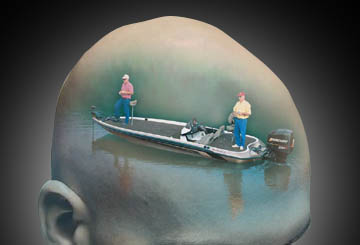Pro pointers No. 3: Do you have a winning attitude?

Ask most anglers, competitive or otherwise, what the main difference is between winning a tournament and just doing well, and you are likely to hear a number of different answers. Some will say tournament experience is the most important thing, while others will mention lake knowledge or awareness of fish-location patterns. A few might even mention specific baits or techniques.
However, tournament champions – especially repeat winners like George Cochran, Larry Nixon, Jay Yelas and Kevin Van Dam – will explain the difference between winning and placing with just one word: attitude! If your attitude is confident, calm and determined, if you know you belong in this field, and if you genuinely expect to win, you mentally put yourself in position to come out on top. However, if you do not have a winning attitude, everyone else will have to do poorly in order for you to finish first. Let’s look at how the attitude of a champion and the attitude of an also-ran differ over the course of a tournament.
Pre-tournament preparation
Building a winning attitude starts well before competition day. In the weeks leading up to a tournament, champions think through current and pending weather conditions and fish migration patterns. They are not so much worried about finding where the fish are today as they are interested in discovering where the fish will be, or where they will be going during the course of a tournament. Winners know that conditions rarely stay the same for long, and they also know that changes in wind, water levels and current can have significant effects on where biting fish are to be found.
Perhaps most importantly, champions do not focus their preparation on finding some fish; instead, they orient themselves to discover the kind of fish that will win the tournament. In addition, a championship attitude includes unequivocal confidence that you belong in this tournament and have a genuine chance of winning it.
Contrast this with the mental preparation of most would-be winners. Many competitors, especially in the early stages of their careers, began with a “happy to be here” attitude. This often includes a feeling of inferiority, of being one down from the “real” pros. I remember being surprised at one of the first pro-am events I entered to hear my pro angler say, “Well, I’m no Larry Nixon.” Unfortunately, that kind of attitude will make it very difficult for him to ever beat Larry Nixon.
Additionally, a less-than-winning attitude almost always includes a focus on finding enough fish to come to the weigh-in and not be embarrassed. Many are the sleepless nights of nonwinners who hope and pray the few fish they found in practice will still be there tomorrow. This fishing-not-to-lose attitude typically includes a substantial amount of performance anxiety, and performance psychology tells us that anxious people make short-sighted decisions.
You and I and every other tournament angler have had the same gut-wrenching feeling on tournament morning when the fish that were there yesterday are suddenly gone. At that point, most of us have a hard time refocusing, reviewing our options and going back to the discovery mode that allowed us to find those fish in the first place. Winners, on the other hand, will have confidently anticipated that the fish might move, and they also will have developed ideas about where they may have gone and how they might now be caught. They easily slide into Plan B, Plan C or even Plan D, while the rest of us fretfully flail away and wonder uselessly what went wrong.
Tournament time
Once a tournament begins, anglers with a winning attitude often pull away from the rest of the field. In multiple-day events, however, an interesting psychological phenomenon can occur when a few anglers who didn’t really expect to win find themselves atop the leaderboard. Suddenly and surprisingly such anglers may experience what can best be called a transient winning attitude (TWA).
If you fish tournaments, you no doubt have had a TWA or two, and if you have, you know what a great feeling it is. However, if you don’t also have a solid winning attitude, there can still be a part of you that wonders whether you can keep this up for another day or two or three. If this reflects how you think, it’s pretty unlikely your TWA will carry you through the rest of the tournament. It might, but you wouldn’t bet on it; and the anglers who have real confidence and unwavering winning attitudes won’t be intimidated by you.
Fear of failure
Performance psychology highlights two important dynamics that can interfere with developing a genuine winning attitude. The first of these is called fear of failure. Anyone who has experienced any form of competition is familiar with the tension and apprehension that go with wanting to do your best while, at the same time, worrying about doing poorly and making a fool of yourself. Musicians, athletes and other performers report the same worrisome dreams anglers have about over-sleeping on performance day, forgetting basic skills and making embarrassing, foolish mistakes.
Champions with confident, winning attitudes may still experience some game-day jitters, though once competition begins, they typically experience an attitudinal transformation that would-be winners do not. True winners focus primarily on doing their very best in the moment. They are skilled at pushing the final outcome to the back of their minds while they are competing.
Many top performers use the phrase “in the zone” to characterize the sense of immediacy, the focused concentration and the in-the-moment awareness they experience in their best events. Compare this to the attitude of also-rans who repeatedly recalculate the size of the fish they have in the tank, fret about the fish they’ve missed and worry about how much time is left to upgrade their weight.
Fear of success
For some people, creating and maintaining a winning attitude is compromised by what psychology calls fear of success. On the face of that, this concept seems silly. Why would someone be in a competition if they were afraid of winning? As it turns out, some people find the anticipated consequences of being successful almost as psychologically troubling as dealing with the embarrassment of coming in last.
For example, if you win, everyone else will come in second or worst; and if you’re an overly sensitive type, you may feel bad about those who don’t win. I used to play tennis with a guy who just hated to lose. Until I figured out this winning attitude stuff, it was often difficult for me to beat him three sets in a row and not feel concerned about how devastated he was.
Another aspect of fear of success is this: If you win today, then you set up the expectation that you have to win next time, and that notion can create a lot of performance anxiety, because nobody wins all the time. Anglers with championship attitudes know that first, 10th or 50th today has no real bearing on tomorrow. They start each day with the same “I expect to do my best; I expect to be the best” attitude.
So the next time you do your tackle inventory, check out your attitude about winning and see if there isn’t room for improvement there. You’re not Larry Nixon either, but you can have the same winning attitude he has.

————————————————–
Jay T. McNamara, Ph.D., L.P., also known as Dr. Fish, recently finished his book “The Psychology of Exceptional Fishing.” You can order it by contacting Jay via e-mail at this address: [email protected].
————————————————–
Jay T. McNamara, Ph.D., L.P., is a psychologist, who is also an avid bass and walleye angler. With more than 26 years of professional experience complemented by participation in competitive fishing at local and national levels, he is uniquely qualified to illustrate how performance psychology principles apply to tournament fishing.